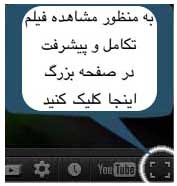General Smedley Butler Testimony At The McCormick-Dickstein Hearing And Media Blackout
All Wars Are Banker Wars! All Bank Owners are Zionist!
Alex Thomson - UK Column - Grand Jury Proceeding the Court of Public Opinion
(Persian - Farsi) THRIVE: What On Earth Will It Take? ( تکامل و پیشرفت )
فیلم تکامل و پیشرفت را باید همه ایرانیان مشاهده کنند
 برای کشف وفراگیری حقایق پشت پرده در مورد کتمان اختراعات و پیشرفتهای تکنولوژی مربوط به استفاده از انرژی پاک، رایگان و بی پایان، به اضافه اختراعات پزشکی و درمانهای مؤثر مفید و جدید. به اضافه افشای دلایل حقیقی ایجاد تمامی جنایات، جنگها، انقلابهای قلابی و توطئه های سیاسی و اقتصادی در ظرف۶۵۰ سال گذشته، در سراسر دنیا، ما بدینوسیله از همه ایرانیان دعوت میکنیم تا فیلم مستند، افشاگر، سودمند و بی همتای تکامل و پیشرفت را مشاهده کنند. ما ایرانیان نباید فراموش کنیم: ملتی که از تاریخ حقیقی خود فرانگیرد، به تکرار تاریخ تلخ خود محکوم خواهد بود
برای کشف وفراگیری حقایق پشت پرده در مورد کتمان اختراعات و پیشرفتهای تکنولوژی مربوط به استفاده از انرژی پاک، رایگان و بی پایان، به اضافه اختراعات پزشکی و درمانهای مؤثر مفید و جدید. به اضافه افشای دلایل حقیقی ایجاد تمامی جنایات، جنگها، انقلابهای قلابی و توطئه های سیاسی و اقتصادی در ظرف۶۵۰ سال گذشته، در سراسر دنیا، ما بدینوسیله از همه ایرانیان دعوت میکنیم تا فیلم مستند، افشاگر، سودمند و بی همتای تکامل و پیشرفت را مشاهده کنند. ما ایرانیان نباید فراموش کنیم: ملتی که از تاریخ حقیقی خود فرانگیرد، به تکرار تاریخ تلخ خود محکوم خواهد بود
"You never change things by fighting the existing reality. To change something, build a new model that makes the existing model obsolete." R. Buckminster Fuller
Aside from English, Thrive is also available in English with English subtitle for the hearing impaired. Thrive is available in: Arabic, Bosnian, Chinese, Croasian, Dutch, Farsi - Persian, French, German, Greek, Hungarian, Hebrew, Italian, Japanese, Korean, Nederlands, Portuguese, Polish, Russian, Spanish and Swedish languages as well.
Here are three New, or Free Energy generators, already tested and available friction free permanent magnet motors working with permanent magnet bearings and turbines by SKF, Rolls-Royce and Siemens, which could easily power large trucks, cargo ships, airplanes, cars and homes.
SKF BeyondZero TV – SKF Permanent Magnet Motor and Magnetic Bearings
https://venusproject.org/new-energy/skf-permanent-magnet-synchronous-motors-and-bearings.html
Rolls-Royce - Permanent Magnet Propulsion Technology
https://venusproject.org/new-energy/rolls-royce-permanent-magnet-propulsion-technology.html
SIMOTICS Active Magnetic Bearing-Technology From Siemens
https://venusproject.org/new-energy/simotics-active-magnetic-bearing-technology-from-siemens.html
The Criminal and Barbaric Islamic Republic of Mullah's Government in Iran, Implementing Gender Segregation
77 Academic Subjects Announced Not Suitable for Women
- By Behrouz Samadbeighi - August 7, 2012
The 935,000 applicants to Iranian universities for the next academic year face unprecedented gender discrimination in some study subjects. New previously un-announced restrictions are barring women from pursuing certain university studies. Most of these academic programs are generally in the engineering fields which until last year were equally open to men and women. With the new regulations, some 77 specific academic fields at the graduate level will be denied to women in the country's 36 government universities.
From 28 to 30 June this year some 1 million and 660 thousand applicants took the national university entrance examinations in Iran. From amongst them over 935,000 of the accepted applicants must announce their specific field of study to the national educational evaluation organization by August 13 and then wait for confirmation from the agency. Until a few days ago the wide participation of women in four groups: empirical sciences, the human sciences, the arts and foreign languages dominated the news. Today, the wide and unannounced gender discrimination is the news topic of the day. Responses to the new restrictions have been so extensive that even the Ministry of Education's academic evaluation organization has taken a position against it and it appears that a review and reversal of the decision may be in the making.
The testing deputy of the organization rejected the gender discrimination at universities and said, "Because of some considerations, it is possible that through their annual tests certain universities may admit only men or women to certain academic fields, but this does not mean that student admission to these fields is restricted to a specific gender because other universities follow their own admission policies and applicants can apply to the same fields in other universities."
Seyed Jalal Tabatabai implicitly accepts the new decision of the universities. "The need to admit students to different fields is determined by universities and in principle this decision is made on the basis of the needs and necessities of society. Therefore, some fields in some years are only available to men or women," he said.
The director general for the spread of education at the ministry of science, research and technology however is more direct. "Universities draw up plans for the future of higher education in the provinces and other parts of the country on the basis of the results they obtain from the entrance exams and the state of higher education in the past. They also consider their capacity and the needs of society." Seyed Abolfazl Hassani added, "Some fields are not very suitable for women's nature such as agricultural machinery or mining, partly because of the hard work involved in them. Past experience shows that women do not become professionally active in these fields after they are admitted to these subjects and even after they graduate. This results in unemployment of graduates."
A few days after these remarks, however, the official was forced to change his position and said, "Letters have been sent to the heads of these universities to enquire about the reasons for their decision. This is because if a university decides to admit only men or women to specific academic programs, it must first establish the necessary infrastructure for such a gender separation."
Hossein Tavakoli, the senior advisor to the entrance examination organization also announced that a new policy directive had been issued which states that a new coding system for academic subjects had been instituted in the organization which resolved the issue of gender restrictions.
Subjects OK Until Last Year, but Not Now
Amid the corrections and announcements by officials, Mehr news agency looked into the manual on subject selection and concluded that the 36 universities do not carry master's graduate programs for women in 77 specific fields. Last year, these very universities had admitted women to the same subjects that are banned today.
For example, a university in Ardebil had 24 fields; one in Lorestan had 18 fields and the International School of Imam Khomeini had 15 fields had the most admittances only to men in these 77 fields.
Urban development engineering, urban development with a major in surveillance at 15 universities had the largest number of students reserved only for men. Following that came management and mining engineering programs in 12 universities which only admitted men to them.
But academic subjects that are denied to women are not restricted to these and others such as accounting, education fields, restoration of historic buildings, pure chemistry etc are also shut to women.
In this regard, the Oil Industry University also announced that "at the moment it did not have any need for women resources."
The head of the public relations office of this school announced that "the management of the oil industry did not believe that the harsh conditions of operations in this field did not make it suitable for women." He continued, "According to recent surveys conducted by the public relations office of the Oil Industry University, not all women students were satisfied with the fields and conditions to which they had been admitted." According to him, between the years 1939 and 2000 no women were admitted to this school. Since 2000, women have been admitted to all programs except drilling.
According to Khabar Online, Alame Tabatabai University's course book booklet for this year has reserved the following fields only for men: social work, accounting, industrial management, and hotel management while reserving these fields for women: education, political science, library science and information dissemination. Chamran University of Ahvaz too has taken measures to only admit men to its engineering programs. This denies women the possibility of pursuing education in the fields of math and technical sciences in that province. Since these two schools are the main institutions of higher education in the province, the denial means that women for the first time cannot study petroleum related subjects there. This limitation does not exist for women in other universities such as those in Tehran, Shiraz or Tabriz. This forces women who are interested in these fields to move to other regions of the country which makes them less competitive because of the strengths of the residents of those provinces.
Gender separation has been a serious policy pursued by Mahmoud Ahmadinejad's administration which has repeatedly been defended by Kamran Daneshjoo, the minister of science. The basis for this policy is the policy to separate men and women on campuses. But the president's office has issued a special directive to the minister of science and universities questioning the single-gender classrooms that some universities had instituted and demanding that the practice be stopped. But segregation continues at the institutions and is even expanding as the new policies indicate.
Iranian Women Excluded From Major Areas of University Study
U.S. Department of State - Press Statement - By Victoria Nuland - August 21, 2012
Department Spokesperson, Office of the Spokesperson, Washington, DC
We have seen reports that 36 Iranian universities have banned women from 77 critical fields of study including engineering, education, and counseling. This decision represents a significant regression for women in Iran, who have outnumbered men in universities for over a decade, and will further restrict the ability of Iranian women to find employment.
A number of university deans have justified their actions by stating that certain courses have a “manly nature” and are not suitable for women, while Science Minister Kamran Daneshjoo has called the segregation effort a top priority to protect morality. These statements undermine the efforts of Iranian women to freely determine their futures and diminish the potential of the Iranian workforce.
We call upon Iranian authorities to protect women’s rights and to uphold Iran’s own laws and international obligations which guarantee non-discrimination in all areas of life, including access to education.
New Inventions: Machine Reverts Plastic Back To Oil - (English subtitles)- April 13, 2009
Read the article: http://ourworld.unu.edu/en/plastic-to-oil-fantastic/ The Japanese company Blest has developed one of the smallest and safest plastic-to-oil conversion machines out on the market today. It's founder and CEO, Akinori Ito is passionate about using this machine to change the way people around the world think about their plastic trash. From solving our landfill and garbage disposal issues to reducing our oil dependancy on the Middle East, his machine may one day be in every household across Japan. While holding up a bag of trash, he states, "It's a waste to throw away, isn't it? This is a treasure."



